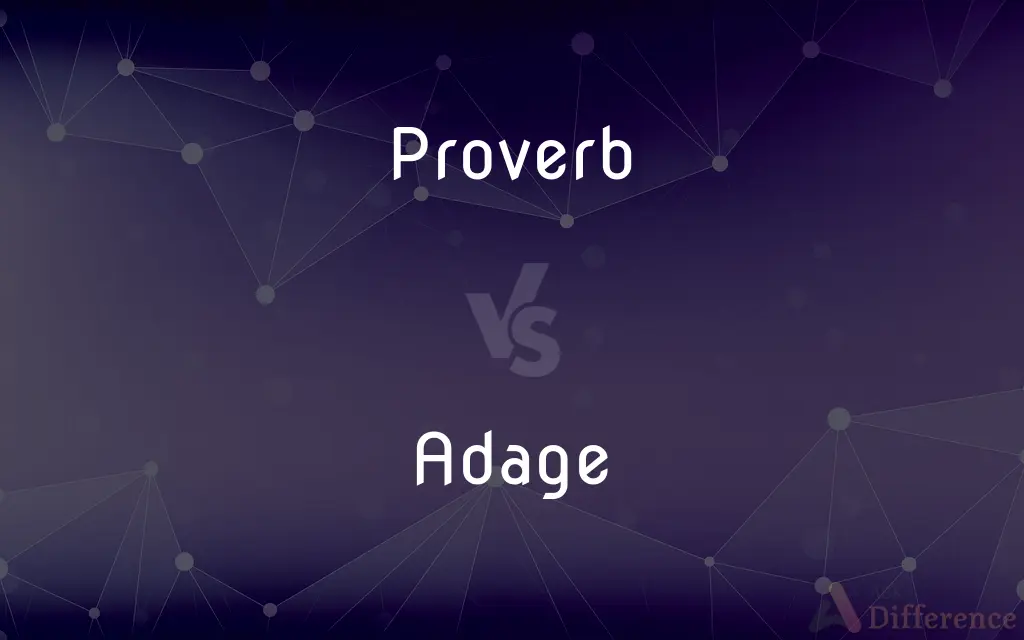Proverb vs. Adage — What's the Difference?
By Fiza Rafique & Maham Liaqat — Updated on March 27, 2024
A proverb is a brief, common saying that gives advice or shares a universal truth, while an adage is a proverb with a traditional, longer-standing reputation for wisdom.

Difference Between Proverb and Adage
Table of Contents
ADVERTISEMENT
Key Differences
A proverb is often a simple, traditional saying that expresses a truth based on common sense or experience. It is used in everyday language to convey wisdom or advice succinctly. On the other hand, an adage is a type of proverb that has gained credibility and recognition over a long time, becoming an accepted truth within a culture.
Proverbs are known for their ability to encapsulate life lessons or moral values in a nutshell, making complex ideas accessible to everyone. Whereas adages, by virtue of their longevity and widespread acceptance, often serve as benchmarks or guiding principles for behavior and belief in a society.
The use of proverbs is prevalent in oral traditions and literature across the world, serving as a bridge between generations. Adages, however, are often cited in more formal contexts, such as academic writings or philosophical discussions, reflecting their esteemed status and the universal truths they represent.
While proverbs can be specific to a culture, reflecting the values, beliefs, and experiences of that community, adages tend to transcend cultural boundaries, resonating with universal themes of wisdom, truth, and human nature.
The appeal of proverbs lies in their brevity and the ease with which they can be remembered and applied to everyday situations. Adages, while also memorable, carry the weight of authority and tradition, making them more likely to be invoked in arguments or as justifications for actions.
ADVERTISEMENT
Comparison Chart
Definition
A short, common saying expressing advice or truth.
A proverb with a long-standing reputation for wisdom.
Origin
Can be relatively recent, reflecting current norms or values.
Has ancient roots, often passed down through generations.
Usage
Used in everyday language and informal contexts.
Often cited in formal contexts or writings.
Cultural Ties
Reflects specific cultural or societal values and experiences.
Transcends cultural boundaries, embodying universal truths.
Authority
Viewed as practical advice based on experience.
Holds a weight of traditional authority and wisdom.
Compare with Definitions
Proverb
A short, traditional saying that offers advice or insight.
A stitch in time saves nine.
Adage
A proverb or short statement expressing a general truth.
Time heals all wounds.
Proverb
A concise statement used to express a truth or principle.
Better safe than sorry.
Adage
An old, well-known saying that illustrates a common fact or experience.
Where there’s smoke, there’s fire.
Proverb
A folklore genre embodying moral lessons.
The early bird catches the worm.
Adage
A statement that has gained credibility through long use.
All that glitters is not gold.
Proverb
A common expression reflecting collective wisdom.
Absence makes the heart grow fonder.
Adage
A wise saying that has become part of the cultural lexicon.
Rome wasn’t built in a day.
Proverb
A rhetorical device used for emphasis or teaching.
Actions speak louder than words.
Adage
An expression that conveys a principle of good or ethical conduct.
Honesty is the best policy.
Proverb
A proverb (from Latin: proverbium) is a simple and insightful, traditional saying that expresses a perceived truth based on common sense or experience. Proverbs are often metaphorical and use formulaic language.
Adage
An adage (; Latin: adagium) is a concise, memorable, and usually philosophical aphorism that communicates an important truth derived from experience, custom, or both, and that many people consider true and credible because of its longeval tradition, i.e. being handed down generation to generation, or memetic replication.
Proverb
A short pithy saying in frequent and widespread use that expresses a basic truth or practical precept.
Adage
A proverb or short statement expressing a general truth
The old adage ‘out of sight out of mind’
Proverb
Proverbs (used with a sing. verb) See Table at Bible.
Adage
A saying that sets forth a general truth and that has gained credit through long use. See Usage Note at redundancy.
Proverb
A phrase expressing a basic truth which may be applied to common situations.
Adage
An old saying which has obtained credit by long use.
Proverb
A striking or paradoxical assertion; an obscure saying; an enigma; a parable.
Adage
An old saying which has been overused or considered a cliché; a trite maxim.
Proverb
A familiar illustration; a subject of contemptuous reference.
Adage
An old saying, which has obtained credit by long use; a proverb.
Letting "I dare not" wait upon "I would,"Like the poor cat i' the adage.
Proverb
A drama exemplifying a proverb.
Adage
A condensed but memorable saying embodying some important fact of experience that is taken as true by many people
Proverb
To write or utter proverbs.
Proverb
To name in, or as, a proverb.
Proverb
To provide with a proverb.
Proverb
An old and common saying; a phrase which is often repeated; especially, a sentence which briefly and forcibly expresses some practical truth, or the result of experience and observation; a maxim; a saw; an adage.
Proverb
A striking or paradoxical assertion; an obscure saying; an enigma; a parable.
His disciples said unto him, Lo, now speakest thou plainly, and speakest no proverb.
Proverb
A familiar illustration; a subject of contemptuous reference.
Thou shalt become an astonishment, a proverb, and a by word, among all nations.
Proverb
A drama exemplifying a proverb.
Proverb
To name in, or as, a proverb.
Am I not sung and proverbed for a fool ?
Proverb
To provide with a proverb.
I am proverbed with a grandsire phrase.
Proverb
To write or utter proverbs.
Proverb
A condensed but memorable saying embodying some important fact of experience that is taken as true by many people
Common Curiosities
Do adages hold more authority than proverbs?
Yes, adages often carry greater authority due to their age and widespread acceptance.
How does an adage differ from a proverb?
An adage is a proverb known for its long-standing reputation and wisdom.
Can proverbs and adages change over time?
While the wording may evolve, the core message of proverbs and adages tends to remain constant.
How are proverbs used in communication?
Proverbs are used to convey wisdom, advice, or truths succinctly in conversation.
How do proverbs and adages contribute to language?
They enrich language by providing a concise, impactful way to convey wisdom and insights.
Why are proverbs important in culture?
Proverbs play a crucial role in passing down wisdom and values across generations.
Can a saying become an adage over time?
Yes, if a saying gains widespread acceptance and is used over generations, it can become an adage.
Is it possible for a proverb to lose its relevance?
Yes, as societies evolve, some proverbs may lose their relevance or change in meaning.
Why are some proverbs similar across different cultures?
Similar experiences and truths across human societies lead to the creation of similar proverbs.
What is a proverb?
A proverb is a short, common saying that gives advice or shares a universal truth.
Are adages universally recognized?
Many adages are recognized and respected across different cultures due to their universal truths.
Do proverbs reflect cultural values?
Yes, proverbs often reflect the values, beliefs, and experiences of a specific culture.
Can anyone create a proverb or adage?
While anyone can coin a saying, it gains the status of a proverb or adage through widespread use and acceptance.
What role do adages play in literature?
Adages are often used in literature to convey universal truths and add depth to the narrative.
How do adages influence behavior?
Adages can guide behavior and decision-making through their embedded wisdom.
Share Your Discovery

Previous Comparison
Hawk vs. Hork
Next Comparison
Hake vs. ShakeAuthor Spotlight
Written by
Fiza RafiqueFiza Rafique is a skilled content writer at AskDifference.com, where she meticulously refines and enhances written pieces. Drawing from her vast editorial expertise, Fiza ensures clarity, accuracy, and precision in every article. Passionate about language, she continually seeks to elevate the quality of content for readers worldwide.
Co-written by
Maham Liaqat













































